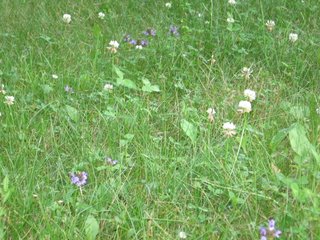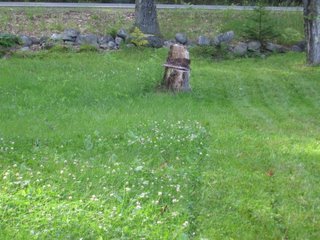Freedom Lawn (or, How Hannah Holmes Changed my Life)
I have what most American suburbanites would describe as “a crappy lawn.” The US ideal, as promoted by the people at Scotts, Chemlawn, and even the environmentally friendly Nature’s Lawn, is a lush sea of green grass. Neither flower or non-conforming foliage must tarnish the landscape.
My lawn, on the other hand, is comprised of clover, dandelions, paintbrushes, buttercups, strawberry vines, baby ferns, some purple flowers that I kind of like (and some white ones, too), a bunch of things that I should know the names to by now, and at least three varieties of grass, including the crab variety. It’s a mess.
 Is this any way to run a lawn?
Is this any way to run a lawn? Then I met Hannah Holmes, who talked me out of even that.
That’s not entirely true. I didn’t actually meet Ms. Holmes, though I live only about 20 miles away from her South Portland home. I did, however, receive a copy of her 2005 book Suburban Safari, in which she spends a year documenting the actions of the flora and fauna in her own back yard. And right there on page 103 Holmes introduced me to the concept of the Freedom Lawn:
The freedom applies both to the plants and the people, the latter of whom
needn’t water, fertilize, pesticize, or other otherwise interfere. Nurseries now
sell Freedom Lawn seed mixes, for lawn owners who life in parts of the world
that have been shortchanged in weeds. But even before I came across the official
term, I thought of my yard as a Darwin Lawn. Whatever could survive the mower
and the drought was welcome to stay.
Monocultures are sickly, that’s a scientific fact. While it’s true that some
plants fight each other, it’s also true that a high diversity of plants protects
everybody. Together, the plants pool their talents. Each plant probably repels a
few harmful insects. Each probably attracts a beneficial insect or two. The
wastes of one species feed the roots of the next. The bold produce shade for the
shy. They also dilute themselves, making it tougher for diseases to roll from
clover to clover, or ryegrass to ryegrass. This has been proven in experiments:
A plot of grassland hosting many species produces a lot more total greenery than
a plot with fewer species. Even the most carefully tended plot of a single
species can’t compete.

Looks OK when you mow it!
Suburban Safari is full of such practical advice. While promoted as a chronicle of the activity in Holmes’ back yard over the course of a year, it is much more than that. Holmes takes on such important topics as global warming, disease, invasive plants and animals, and, importantly, water diversion. The last topic isn’t one that we hear about much in New England, which receives ample precipitation most years, but it is an issue in the desert southwest where rivers and groundwater are depleted to feed agriculture, humans and, increasingly as the population grows, human lawns. It takes a lot of water to grow grass. Growing grass where there isn’t a lot of rainfall requires one to divert water from other, more practical uses. The problem is exacerbated by the fact that human population centers require a lot of pavement, which doesn’t absorb rainfall but instead sends it down into the sewers. Less absorbed rainfall means more water needs to be diverted. It’s a downward spiral.
The book does live up to it’s original billing as well, and it’s an interesting story. Like any good story, there is romance, violence, and the struggle to survive. It’s man vs. nature as well as nature vs. nature. We follow crows, chipmunks, squirrels, ants, slugs and spiders. We also follow oak trees, apple trees, pear trees and grape vines. We see how plants, animals and humans fight amongst themselves for space. Most enlightening was Holmes’ description of the defense mechanisms employed by the trees. We all know that plants are living things, but Holmes portrays them as, if not thinking beings, species that are able to adapt to threats and changing conditions, and even react with unseen, unknown defense mechanisms. It’s a fascinating read.
There is much to be learned from Suburban Safari. Some of it is in the “cool to learn something new” department, like the aforementioned discussion of the trees. But much of it is practical advice for what we as humans can do to preserve the natural world around us. It is an eye-opening look at how our attitudes toward rain water, energy usage, chemicals and invasive species affect our communities and our lives. Highly recommended.


12 Comments:
This is outstanding!
The UMaine extension service also has a dirt cheap pamphlet on sourcing Maine native plants statewide from nurseries and garden stores for your flowerbeds, should you be interested.
Also, I understand that much of the new parking lots, sidewalks, etc built in Germany for the late World Cup use "porous concrete" that allows water to drain through but blocks oil, etc. I bet it costs a bomb, though.
HEY!!!!!
Thanx so much for reading my book, and for finding the beauty in you freedom lawn!
Hannah Holmes
I am sold so count me in! I read about the Freedom Lawn in the New Yorker and now appreciate the logic in this smart approach.
That is awesome, your freedom lawn is very pretty. I just read about it the New Yorker. I have a bare spot in my back yard where I'd like to plant some clover but I'm having trouble finding seed.
I read Suburban Safari a few months back and fell in love with the concept of a freedom lawn. Sadly, I don't have a yard, but if I did...
I'm actually using this book in my graduate program at Goddard College - it's a degree in Sustainable Communities and I want to suggest that small steps, like Freedom Lawns, put us on the right track to more sustainable living. Perhaps I could bounce some ideas off of you, or at least get some information about and pics of your yard.
I have a couple of nice shots of my Freedom Lawn in Williamsburg, VA. If you want them, tell me where/how to email them to you. Also, is there any site with promotional/design/bumper sticker-type stuff on it? I want to promote the concept at an upcoming Farmer's Market in my community.
Thanks in advance.
kwren@widomaker.com
Found very useful information on behalf of the social network of people in here, very nice to meet you and nice sharing. Good works.
chat seviyeli sohbet sohbet odaları sohbet siteleri sohbet odaları sohbet odaları seviyeli sohbet mirc indir cet sohbet sohbet sitesi sohbet odasi sohbet Odaları seviyeli sohbet sohbet Odaları
I am an environmentalist, so I am looking into doing this as well. I really enjoyed reading of your experience.
This freedom lawn is brilliant! With this idea and proper maintenance, surely your lawn will be greener and more beautiful. Thanks for sharing!
tree cutting expert acworth GA
Native plants are so important to our eco system. There's alot of online nurseries that has a killer variety.
i love native plants too. Elderberry, possom haw and vibrunums too.
I love anything to do with nature!
Post a Comment
<< Home